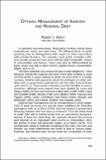| dc.contributor.author | Barro, Robert J. | |
| dc.date.accessioned | 2019-11-01T00:01:27Z | |
| dc.date.available | 2019-11-01T00:01:27Z | |
| dc.date.issued | 2002 | |
| dc.identifier.isbn | 956-7421-110 | |
| dc.identifier.uri | https://hdl.handle.net/20.500.12580/3630 | |
| dc.description | In standard macroeconomics, fiscal policy involves choices about expenditures, taxes, and debt issue. The different kinds of public spending may be distinguished with respect to their interactions with private decisions. For example, some public activities influence private production and some interact with households’ choices of consumption and leisure. Taxes may also be differentiated by types, levies may fall on labor income, capital income, consumption, bodies, and so on. | |
| dc.format | .pdf | |
| dc.format.extent | Sección o Parte de un Documento | |
| dc.format.medium | p. 135-150 | |
| dc.language.iso | eng | |
| dc.publisher | Banco Central de Chile | |
| dc.relation.ispartof | Serieson Central Banking, Analysis, and Economic Policies, no. 2 | |
| dc.rights | Attribution-NonCommercial-NoDerivs 3.0 Chile | * |
| dc.rights.uri | http://creativecommons.org/licenses/by-nc-nd/3.0/cl/ | * |
| dc.subject | POLÍTICA FISCAL | es_ES |
| dc.subject | DEUDA PÚBLICA | es_ES |
| dc.subject | MACROECONOMÍA | es_ES |
| dc.title | Optimal management of indexed and nominal debt | |
| dc.type.doc | Artículo | |
| dc.file.name | BCCh-sbc-v02-p135_150 | |


